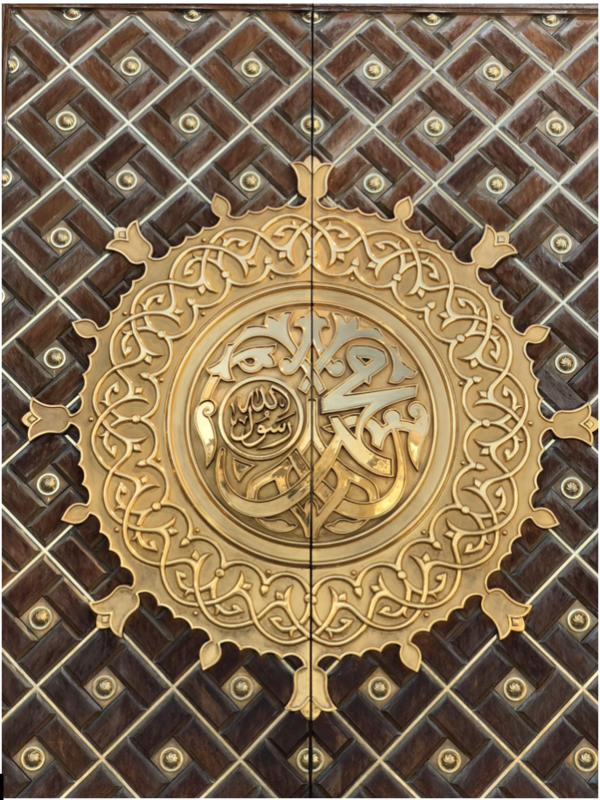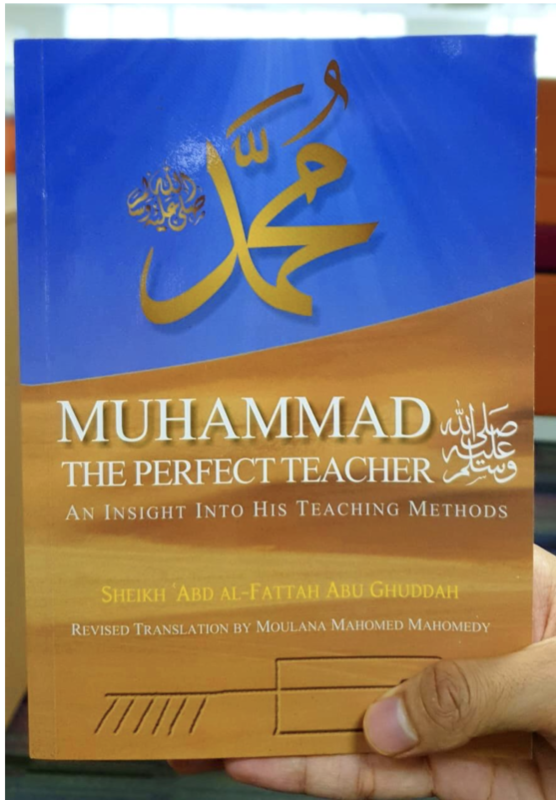Prophet Muhammad s.a.w. as a Teacher
This article was first published on 2 September 2021 and has since been updated as of 5 September 2025.

لَّقَدْ كَانَ لَكُمْ فِي رَسُولِ اللَّهِ أُسْوَةٌ حَسَنَةٌ لِّمَن كَانَ يَرْجُو اللَّهَ وَالْيَوْمَ الْآخِرَ وَذَكَرَ اللَّهَ كَثِيرًا
“There is indeed a good model for you in the Messenger of Allah - for the one who has hope in Allah and the Last Day and remembers Allah profusely.”
(Surah Al-Ahzab, 33:21)
The Prophet’s admirable character is evident in the Quran. As a clear exemplar, this can be seen in all aspects of the Prophet’s life from his sayings, actions and conditions. His elegance is a true form of beauty and truth that captured the hearts of many. The companions’ love for the Prophet s.a.w. developed into a strong sense of conviction to the principles of the religion. From a relatively small community compared to the bigger civilisations of the time, these very same companions, with the likes of Abu Bakr, Umar, Uthman and Ali r.a. became impactful luminaries in world history. The Prophet's impart of Divine knowledge to his companions embodied the universal mercy that is witnessed in the Quran.
وَمَا أَرْسَلْنَاكَ إِلَّا رَحْمَةً لِّلْعَالَمِينَ
“We have sent you (O Prophet) only as a mercy for the whole world.”
(Surah Al-Anbiya, 21:107)
Have you ever wondered how did the Prophet transform his community into a community of success and mercy? What were the systematic approaches and some of the methods used in his teachings?
This brief article consists of short excerpts from the book “Muhammad s.a.w. the perfect teacher; An insight into his teaching methods” by the late scholar Sheikh Abdul Fattah Abou Ghuddah, may Allah grant him mercy.
Most of the points are derived from the narrations by the Companions of the Prophet s.a.w. In total, there are 40 methods listed by the writer. This brief write-up has no intention of compiling all his teaching methods as seen in the narrations, for indeed they exceed in number.
1. Unique traits of the Prophet s.a.w.

The Prophet s.a.w. had many unique traits as a teacher that can be summarised into three main parts; his character, speech and actions. In terms of his character, he had mental composure, correct thinking and acute foresight. These can be seen in instances like The Treaty of Hudaybiyah.
Read: 3 things to know about the story of Hudaibiyah
He remained firm and patient in the face of adversity. He would neither cower in hardship nor succumb to difficulty.1 He was humble before his own followers even though they were very obedient to him. The Prophet s.a.w. can be seen walking around marketplaces, blending in with the companions and sitting on the ground. He never isolated himself from the poor and the people who are in need the most. The Prophet s.a.w. also kept his promises and fulfilled them.
In terms of his speech, it was based on wisdom and knowledge. He was proficient in explanation and confident in his words.2 In fact, he never erred in speech. His ability to memorise all that was revealed to him was a big factor in his proficiency. Attaining the proper understanding of knowledge is indeed important but often today, people emphasise less on the significance of memorising.
The Prophet also encouraged and actively promoted excellent morals. This meant that he was responsible in his speech and that it was based on a noble cause rather than a petty desire to sound good or that which leads to indecency. He spoke concisely on matters without being excessive in speech:
أُعْطِيتُ جَوَامِعَ الْكَلِمِ
“I have been bestowed with the ability to say a few words but comprehensive in meaning.”
(Sahih Muslim)
In terms of his actions, much can be said, especially in the later parts of this article. However, I would like to point out that the Prophet s.a.w. is devoid of excessiveness and shortcomings. He emphasised simplicity (different from being simplistic) and following the middle and balanced path (wasatiyyah).
2. His methods of teaching

Teaching by his way of life and sublime character:
The Prophet s.a.w. would teach firstly by his actions. When the Prophet s.a.w. wanted to issue an order, he would carry it out himself first. The people would thereafter emulate him and execute what they had seen him perform.3 None would see him in contradictions with his teachings. His way of life is the embodiment of the Divine teachings. Aishah r.a., wife of the Prophet, when asked about his character both in public and private, replied in a famous narration:
كَانَ خُلُقُهُ الْقُرْآنَ
"His character was the Quran"
(Al-Adab Al-Mufrad)
Teaching in stages
One of the important teaching methods used by the Prophet s.a.w. is to observe a gradual approach when teaching or advising, as well as identifying the hierarchy of knowledge. This means that the Prophet was mindful of the circumstances of his Companions. A gradual and systematic approach would help the student to absorb and understand better before moving on to the next part of the lesson. A heavy input might overwhelm the person or worse, create more confusion.
A Companion, Jundab ibn Abdullah r.a. said:
“We were with Rasulullah s.a.w. – (at the time) a group of youth close to the age of maturity. We learnt what was Iman (faith) before we could learn the Quran. Thereafter, we learnt the Quran. In this way, we increased our Iman.”
(Narrated by Ibn Majah)

Dialogue and mutual questioning
The Prophet s.a.w. also encouraged the Companions to engage in discussions. By questioning his Companions, the Prophet s.a.w. managed to further capture their attention and develop in them a sense of desire to seek answers. As a result, this stimulated their minds into a thinking process. At the point where they are unable to follow up with an answer or a response, the Prophet s.a.w. would provide clarity and explain. This eventually led to a more lasting impact of the knowledge imparted to the companions.
The Prophet s.a.w. asked “Tell me, if there was a river at one of your doors, and you were to bath therin five times daily, would any dirt remain on him?” The Companion replied, “No dirt would remain on him”. The Prophet s.a.w. said “That is like the (daily) five prayers. Allah wipes away sins through them.”
(Sahih Bukhari and Muslim)
Dialogues, after all, open the locks of the mind.4 Al-Imam Az-Zurnuji cited Sayyiduna Ali bin Abi Talib in his famous book 'The Instruction of the Student: The Method of Learning’ that
“A person would not go into ruin because of (active) consultation”
Appointing a student to answer a question that was raised to the Prophet s.a.w. in order to train the student
This is another important aspect of the Prophet’s method of teaching. He did not only teach merely for the sake of reaching out. Instead, he also ensured that the Companions were empowered with confidence and resilience. Placing trust and responsibility on someone who has developed a passing level of qualities will help instil a positive moral upliftment and confidence in them.
جاء رجلان يختصمان إلى رسول الله صلى الله عليه وسلم فقال رسول الله صلى الله عليه وسلم لعمرو بن العاص: "اقض بينهما". قال: وأنت ها هنا يا رسول الله؟ قال: "نعم". قال: على ما أقضي؟ قال: "إن اجتهدت فأصبت فلك عشرة أجور، وإن اجتهدت فأخطأت فلك أجر واحد"
Two disputants came to the Prophet s.a.w, so he said to ‘Amr ibn Al-‘As: “You pass judgement on these two”. ‘Amr said: “(Can I pass judgement) while you are present here O Prophet of Allah?” He replied: “Yes”. He (‘Amr Ibn Al-‘As) said: “On what basis should I pass judgement?” The Prophet s.a.w. said: “If you endeavour and you are correct (in your judgement), you will be rewarded ten-fold, and if you endeavour and are wrong (in your judgement), you will receive one reward."
(Musnad Imam Ahmad)
3. Inheritors of the Prophet s.a.w.

Image from PERGAS
In conclusion, the writer mentioned that a teacher must strive for the perfection of his personal self. An embodiment of all the ideal qualities both outwardly and inwardly. What better model to look at and emulate from than the one who possesses all these qualities, our beloved teacher and prophet, Muhammad s.a.w.
Scholars and teachers who possess the useful knowledge and the mentioned qualities are inheritors of the prophet that will continue to spread light and bring benefit to all of humankind. In a hadith narrated by Imam At-Tirmizi:
العُلَمَاءُ وَرَثَةُ الأَنبِيَاء
"Scholars are the inheritors of the prophets a.s."
(Sunan At-Tirmizi)
While seeking knowledge online exposes us to various sources that were previously inaccessible, they are but information that does not guide the user into a structured comprehension of the knowledge. It is hence best to utilise these resources with guidance or pointers from credible teachers.
May Allah s.a.w. bless our teachers and grant us useful knowledge that will benefit us both in this world and the hereafter.
And Allah knows best.
[1] Mahomedy, Moulana Mahomed. Muhammad s.a.w. The Perfect Teacher. By Sheikh Abdul Fattah Abou Ghuddah. Muslims at Work, 2013. p.41
[2] Ibid p.44
[3] Ibid p.57
[4] Ibid p.91
*Revised article from 2019

